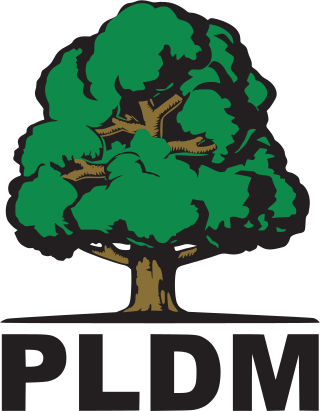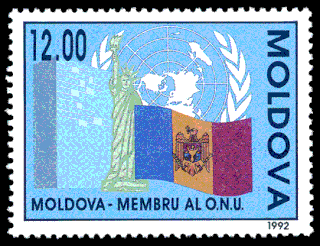
Vladimir Voronin is a Moldovan politician. He was the third President of Moldova from 2001 until 2009 and has been the leader of the Party of Communists of Moldova (PCRM) since 1994. He was Europe's first democratically elected communist party head of state after the dissolution of the Eastern Bloc.

The Party of Communists of the Republic of Moldova is a communist party in Moldova led by Vladimir Voronin. It is the only communist party to have held a majority government in the post-Soviet states. It has been variously described as communist, Moldovenist, populist, Russophile, and pro-Soviet.

Parliamentary elections were held in Moldova on 5 April 2009. The Party of Communists of the Republic of Moldova (PCRM) won a majority of seats for the third consecutive occasion. Turnout was 59%, exceeding the 50% necessary for the election to be valid.

The Liberal Democratic Party of Moldova is a conservative political party in Moldova. The party is led by Tudor Deliu. Until 2016, PLDM was led by Vlad Filat, who was Prime Minister of Moldova from 2009 to 2013, in two cabinets. Immediately after the 2014 parliamentary elections, with 21 seats in the Moldovan Parliament, PLDM was the largest of the three democratic pro-European parliamentary parties.

Marian Lupu is a Moldovan economist and politician who was the President of the Parliament of Moldova between 2010 and 2013. From this position he served as Acting President of Moldova from 2010 until 2012.

The Party of Socialists of the Republic of Moldova is a democratic socialist political party in Moldova. A populist party, it holds Eurosceptic and Russophilic views, both of which are reflected by its long-time former leader Igor Dodon. It is contrasted to like-minded centre-left European parties for its conservative views on social issues, reflecting the country's strong social conservatism and the influence of the Moldovan Orthodox Church.
An indirect presidential election was held in Moldova on 10 November 2009 and 7 December 2009, following the parliamentary election held in July 2009.
The Alliance for European Integration was a centre-right anti-communist ruling coalition in Moldova from the July 2009 election until it lost to a no confidence vote in the Parliament on February 13, 2013. It was succeeded by the anti-communist Pro-European Coalition.

The following is timeline of the History of independent Moldova which started after the independence of Moldova.

Iurie Leancă is a Moldovan politician who was the prime minister of Moldova from 2013 until 2015. He was Minister of Foreign Affairs and European Integration from 2009 to 2013 as part of the First and Second Filat Cabinet.

Parliamentary elections were held in Moldova on 28 November 2010 after parliamentary vote failed to elect a President for the second time in late 2009.

The Commission for constitutional reform is a commission instituted in Moldova by acting President Mihai Ghimpu to adopt a new version of the Constitution of Moldova (1994).

A nationwide referendum was held in Moldova on 5 September 2010 on whether or not the country should amend the Constitution of Moldova to return to direct popular election of the president. Since 2001, the president had been indirectly elected by Parliament, with a supermajority of 61 seats required for election. The voters are asked to answer the following question: "Would you agree with the Constitutional amendment, which would allow the election of the President of the Republic of Moldova by the entire population?" Voters chose one of the proposed options: "Yes (for)" or "No (against)". Of those who had cast their vote, 87.83% chose "Yes". However, the referendum did not pass because only 30.29% of voters turned out, short of the necessary 33% for the referendum to be considered valid.

An indirect presidential election was held in Moldova on 4 April 2001. The Party of Communists of the Republic of Moldova (PCRM) won 50.07% of the vote and 71 of the 101 seats in the February 2001 parliamentary election; by this time the constitution had been changed to provide for election of the President through the Parliament rather than popular vote. In March, the PCRM's Central Committee nominated Vladimir Voronin as its presidential candidate at a plenum, and on April 4, 2001 Voronin was elected as President by the Parliament. Of the 89 deputies participating in the vote, 71 voted for Voronin, 15 voted for Dumitru Braghiş, and three voted for Valerian Cristea. He was sworn in at a ceremony in Chişinău on April 7, 2001. The Constitutional Court ruled that the President could also lead a political party, and Voronin was re-elected as the PCRM's leader.
Events from the year 2012 in Moldova

Pavel Filip is a Moldovan politician.

Nicolae Timofti is a Moldovan jurist and politician who was President of Moldova from 23 March 2012 until 23 December 2016. He served as head of Moldova's Superior Magistrate Council and was elected President by parliament on 16 March 2012.
The 2013 Moldovan government crisis was a governmental crisis that took place in the Republic of Moldova. It started on 8 March 2013, after the Prime Minister Vlad Filat was dismissed by motion of censure of the Parliament. It ended on 30 May 2013, when Iurie Leancă's cabinet received a successful vote of confidence.

Presidential elections were held in Moldova on 30 October 2016. They were the first direct presidential elections since 1996 and followed a declaration by the Constitutional Court on 4 March 2016 that the 2000 constitutional revision that led to the president being indirectly elected by Parliament was unconstitutional. The elections were won by Igor Dodon of the Party of Socialists of the Republic of Moldova (PSRM).

Snap parliamentary elections were held in Moldova on 11 July 2021. Following the resignation of Ion Chicu, the position of Prime Minister became vacant, with the Parliament being obligated to form a new government within three months. After the expiration of the constitutionally mandated period and two failed attempts to win parliamentary approval for the proposed cabinets, the Constitutional Court ruled on 15 April that the circumstances justifying a dissolution of the parliament were met. President Maia Sandu signed the decree dissolving the Parliament on 28 April and snap parliamentary elections were called on.

















